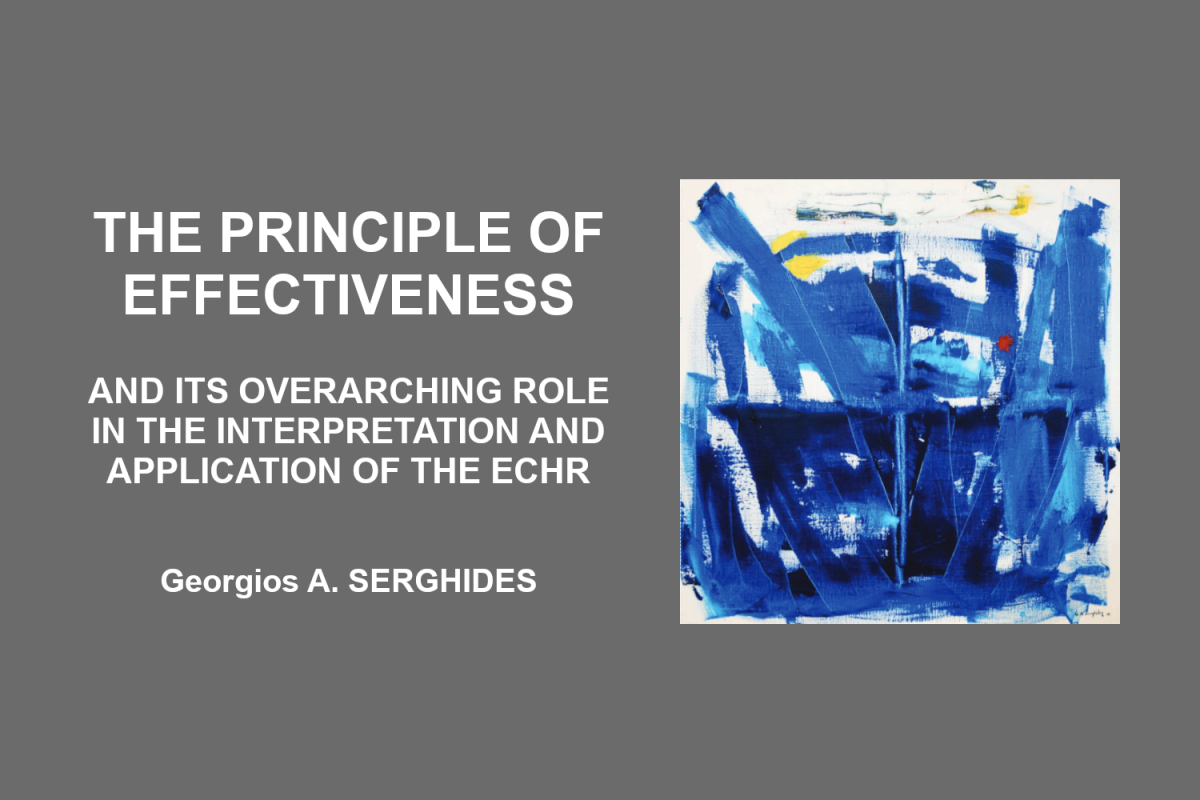The Principle of Effectiveness
And its Overarching Role in the Interpretation and Application of the ECHR
In his latest book, Georgios A. Serghides, Judge and Section Vice-President at the European Court of Human Rights (hereinafter, the ‘Court’), delves into the interpretation and application of the European Convention on Human Rights (hereinafter, the ‘Convention’) in light of the principle of effectiveness (hereinafter, the ‘principle’). The book is divided into two parts, which are again subdivided into two chapters each. In the first part, Judge Serghides analyses the conceptual framework of the principle, notably elaborating on its raison d’être as well as its development and substantiation. Chapter 1 of Part I examines the meaning, capacities and use of the principle, while Chapter 2 of the same part analyses the doctrines deriving from and securing the principle. Part II is dedicated to the operational framework of the principle, notably its polyvalent nature and action. Chapter 1 of Part II examines the dual nature and operation of the principle of effectiveness, while Chapter 2 guides the reader through the principle of effectiveness in action, from the preliminary stage until the completion of the proceedings before the Court as well as its role in the implementation of judgments.
This book is an ambitious undertaking, offering a wide-ranging and comprehensive depiction of the principle of effectiveness as a whole.
Content and Main Findings
Judge Serghides observes two main characteristics of the principle of effectiveness. On the one hand, it is a method of interpretation. On the other hand, it is a norm of international law inherent in each Convention provision. This is where the author brings in a rather new element. The majority doctrine and the Court itself usually treats the principle as a method of interpretation, putting forward that it requires the interpretation which best guarantees the effectiveness of a treaty, considering that the drafters meant for the norm to be applied.
In its capacity as a method of interpretation, the principle of effectiveness requires for the Convention provisions in question to be interpreted as to give it the fullest weight and effect consistent with its natural and ordinary meaning and in its context as well as with its objects and purposes. In other words, the Convention should be interpreted in such a manner that its guarantees are rendered practical and effective, rather than being theoretical and illusory, for their bearer.
According to article 31(1) of the Vienna Convention on the Law of Treaties (VCLT), a treaty shall be interpreted in good faith in accordance with the ordinary meaning to be given to the terms of the treaty in their context and in the light its object and purpose. On this, Serghides argues that the elements of interpretation named in article 31(1) VCLT are the ordinary meaning and the object and purpose of the treaty as well as, albeit of a different nature, good faith and effectiveness, which refer to the manner in which the first two elements should be interpreted. In this vein, Serghides compares the Convention to a human being, with the element of effectiveness being everywhere, in its soul, body and mind.
Judge Serghides postulates that the capacity of the principle of effectiveness as a norm of international law finds its source in each Convention provision; that norm of international law exists as an element as well as the raison d’être of that Convention provision. Through this, the principle, as an inherent part of the norm, achieves its object by way of giving effect to the international legal rule. As Judge Serghides substantiates, treaties are not drafted without the intention that their provisions should operate with effectiveness relating to their scope. He thus considers that “effectiveness” is an indispensable capacity, or an inherent element, of an international legal rule.
As set out in the book, the principle of effectiveness as a norm of international law follows the three significant innovations that the Convention has introduced in international law: The right for individual petitions before the Court (Article 34 of the Convention); the system of collective guarantees provided as regards inter-state applications (Article 33 of the Convention); and the mechanism to resolve complaints, either by settlement or, if necessary, by adjudication through the Court (Article 39 of the Convention). Other Convention provisions, such as Articles 1 and 13, are evoked in this respect.
The author suggests that the Court should, when referring to the principle, adopt the distinction between the two capacities and clarify that it is using the principle both as a norm and as a method of interpretation. In this regard, the author argues that when applying the principle of effectiveness as an international law norm, an inherent element of a Convention norm, it is indispensable to take into consideration its capacity as a method of interpretation. Elaborating this argument, Judge Serghides argues in his concurring opinion in Muhammad and Muhammad v. Romania ([GC], no. 80982/12, 15 October 2020, § 18) that the principle as a method of interpretation would not fulfil its task if it were to be employed such as to assist in interpreting and applying a norm of effectiveness in a Convention provision which was, in the first place, misconstrued as to its nature and content, e.g. by considering the right as a qualified right when it is an absolute right. In other words, in such a case, the principle as a method would work against the principle as a norm, resulting in a breach of the respective right.
Furthermore, Judge Serghides sets out, that the principle as a method of interpretation would lose its strength and importance without its existence as an international law or Convention norm. He summarises the interrelationship between the two identified capacities as follows: Because the legal rule is to be effective (its use as a “norm”), it should be interpreted as such (its use as a “method”).
Having laid down the above framework of his book, Judge Serghides goes on to analyse the Court’s case-law in respect to the principle of effectiveness. He identifies three categories of manners in which the Court applies the principle: ‘Direct and nominal’, ‘indirect and non-nominal’ as well as ‘implied application of the principle’.
The author goes on to recognise the principle as the source of two Convention doctrines, namely the doctrine of the State’s positive obligations to secure human rights on the one hand, and the doctrine that the Convention is a living instrument and that it should be interpreted in the light of present-day conditions on the other hand.
The second part of the books turns to the operational framework of the principle by demonstrating its polyvalent nature and action from two perspectives, having regard to its dual nature, harmonising and defensive, and its action at all stages of the procedure including the implementation of Court’s judgments.
Assessment
In taking upon himself the Herculean task of grasping and categorizing the principle of effectiveness, Judge Serghides has laid fundamental doctrinal groundwork. With the ECHR and the European standards, it represents in flux as society changes, the principle serves as an important benchmark in effectively protecting individual rights. As the author impressively demonstrates, the principle is of central importance in the entirety of the Court’s work, from preliminary proceedings to implementation.
Judge Serghides pays detailed attention to the Court’s respective case-law, scrutinizing it carefully and systematically. One of his main points of critique is that the Court in its judgments does not describe the principle as a norm of international law inherent in all Convention provisions, but merely treats it as a method of interpretation, and this most of the times not so clearly and explicitly. It remains to be seen whether further scholars, or the Court itself, will follow Judge Serghides’ systematization.
Throughout the book, Judge Serghides seeks to categorise and systemise dozens if not hundreds of Court judgments as well as scholarly opinions and theories. The book is written in a distinct linguistic style using many colourful analogies and references to Greek Mythology, making it pleasant to read. The book’s target audience are perhaps judges and registry lawyers of the Court as Judge Serghides repeatedly makes his case for the principle to always be dealt with expressly in the Court’s judgments. Nevertheless, the book may be also interesting for a broader audience of legal scholars and practising lawyers dealing with the Convention system and international human rights law in the wider sense. All things considered, the book can be recommended to anyone seeking to study the principle in depth or even just understand individual aspects of it. Curious students will find plenty of material in an area that deserves further research and attention.

Dr Daniel Rietiker is a Senior Lawyer at the European Court of Human Rights, a part-time Lecturer in Public International Law at the University of Lausanne (Switzerland) and an Adjunct Professor at Suffolk University Law School (Boston, Massachusetts).


Sofie Steller was a trainee at the European Court of Human Rights, where she assisted the Judge in respect of Switzerland as well as the Swiss registry lawyers in their work.